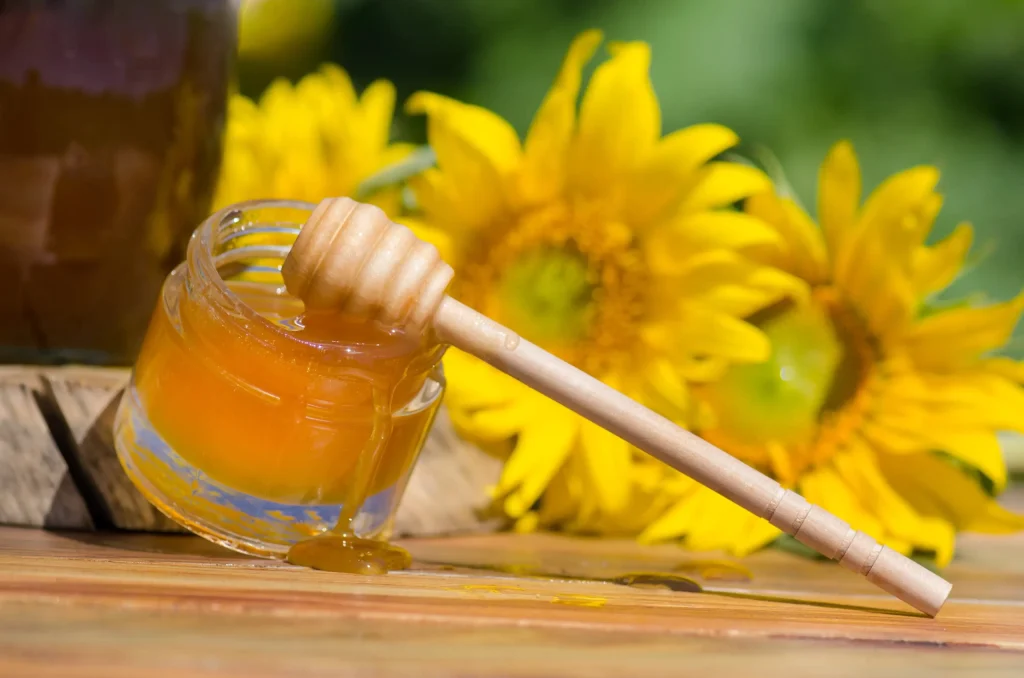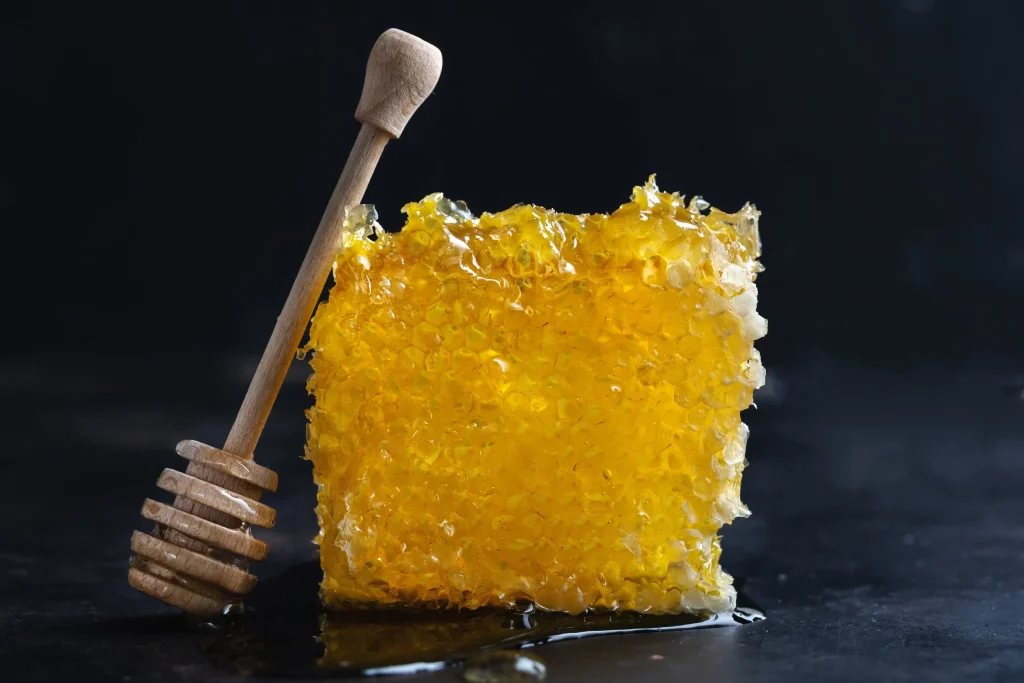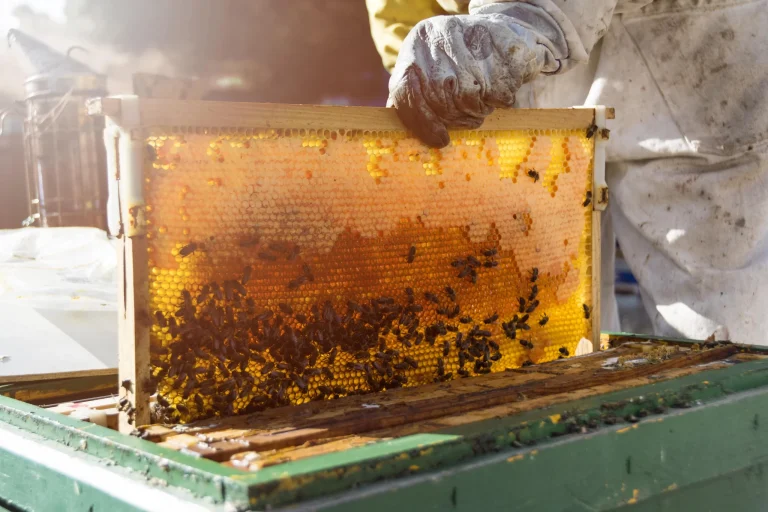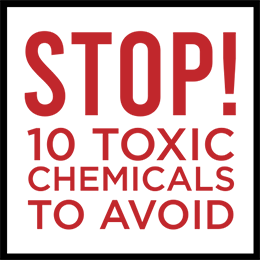Did you know that the very first documented account of using honey was written by the ancient Sumerians more than four thousand years ago? And they didn’t just use it as a food — they used it for honey’s many healing properties. That’s pretty much been the case throughout history. Wherever there’s honey, there’s people using it for medicine.
It’s 2018 now and there’s an over-the-counter drug for most everyday ailments. But there are a lot of reasons why people may be wary of taking the pharmaceutical approach. Side effects, drug interactions, cost, availability. It seems like being healthy is a lot more complicated than it used to be.
So have you ever thought about using a more natural remedy like honey instead? Cultures throughout history from every corner of the world have — why not try it? With all of the health benefits honey has, it’s definitely worth a shot.
Where Do the Health Benefits of Honey Come From?
Honey tastes sweet and sugary like candy but it’s actually very good for your body. Just to name a few, honey is packed with:
- Zinc
- Potassium
- Riboflavin
- Vitamin B complex
- Vitamin C
- Iron
- Magnesium
- Phosphate
- Calcium
- Copper
- Ascorbic acid
Types of Honey to Know for Their Health Benefits
Not all honey is created equal! Honey comes in many forms, and not all of them are medicinal. But the most important distinction should be between processed honey and raw honey.
Processed honey is just what it sounds like — processed. But in that process, many of its healing properties — vitamins, minerals, antioxidants — are lost. If you want to get health benefits from honey, pure, raw honey is the one you want. If you’re buying honey from your local supermarket, it’s probably processed honey.
There are also many different kinds of honey depending on where the bees live. Because each ecosystem is a little different, honey can vary greatly in taste, color, and chemical makeup. Some honey is more beneficial for our health than others. A great general rule of thumb is to remember the darker the honey, the more antioxidants it’ll have (although honey can become darker when it becomes old and loses its healing properties).
Here are some of best honeys for your health:
- Manuka honey: Scientifically proven to strengthen immune system. Also more effective at killing bacteria than any other honey.
- Buckwheat honey: Strengthens immune system and great substitute for cough syrup.
- Black locust honey: Lowest glycemic index of all honey (32)

Note: Honey should not be given to children younger than 1 year old.
1. Weight Loss
Did you know that honey’s actually great for weight loss? You wouldn’t think so because of how sweet it is, right? But it’s true. Honey helps the digestive system process excess fat.
But beware — even though honey is a natural sweetener, that doesn’t mean you can eat as much as you want! Despite the many nutritional benefits of honey, it actually has more calories than both refined and unrefined sugar.
2. Alternative Cough Syrup
There’s a lot of reasons to not like dextromethorphan (DXM), an ingredient in many cough suppressants. It’s dangerous to mix with a lot of medications, and it can even become addictive.
Luckily, studies show that buckwheat honey is just as good as getting rid of a bad cough as DXM — even for children.
3. Facial Exfoliator/Moisturizer
High-quality raw honey (especially Manuka) can double as an exfoliator and a moisturizer. The natural sugars in honey are grainy enough to use as an exfoliant, but gentle enough to use on sensitive skin. And it’s great at hydrating your skin. How convenient is that?
Be sure to apply honey on a clean, damp face. Honey is notoriously thick and sticky, so it can be almost impossible to spread on a dry face.
4. Acid Reflux
Thanks to all of the friendly bacteria in it, raw honey is great for treating acid reflux, ulcers, and indigestion.
5. Improve Your Memory
When it comes to boosting your memory, raw honey is especially beneficial for postmenopausal women. Women’s estrogen levels tend to decline after menopause, and low estrogen levels in women is linked to memory loss. Studies have shown regular honey consumption can also prevent dementia.
6. Cold Sores and Herpes
Okay, so you know the healing properties of honey can help with wounds. But did you know that honey xis great for cold sores, too?
That’s right. Although honey isn’t a cure for herpes, it can help reduce the appearance of those unsightly (and painful) bumps. And it works for both oral and genital herpes.
Here’s how it works. We already know that honey is a great antibacterial and antifungal agent. While the bees produce the honey, they release glucose oxidase — an enzyme that causes the release of hydrogen peroxide when you apply honey on the sore. Also, honey helps draw fluid away from the sore without drying it out.
Pretty convenient when you can’t get to the drugstore, right?
7. Dandruff
Don’t be the person with “snowy” shoulders in the middle of spring. Raw honey can take care of the itchiness, dander, and skin lesions in just a few hours.
Create a slightly diluted honey solution — most agree 90% honey, 10% water. Mix well and spread it over your scalp. Massage it into your scalp for a few minutes and let it sit for 2-3 hours (the longer, the better). Gently rinse out with warm water.

8. Insomnia
Turns out, a warm glass of milk and honey before bed does help you fall asleep.
When you consume raw honey, it triggers the release of tryptophan with a slight spike in insulin levels. The tryptophan is converted into melatonin, a hormone that helps us get restful sleep.
For the best results, try adding honey to a tea with relaxing herbs before bed, like chamomile and lavender.
9. Allergies
I think this is one of the cooler health benefits honey has to offer.
Raw honey, produced locally, can be used as a natural vaccine against allergens. How? Your local honey is going to contain trace amounts of pollen spores. It’s not enough to hurt you, but it’ll be enough for your immune system to build an immunity.
To use honey for allergies, eat a small spoon of honey every day a few months before allergy season. Remember to eat raw, local honey or it won’t work.
10. Acne and Rosacea
One of the many benefits of natural honey is its ability to reduce inflammation. You can use a few tablespoons of honey as a facial mask to soothe any redness or irritation on your face. And the best part — it’ll kill all that nasty bacteria.
11. Boost Your Immune System
In the worst cases, having a weakened immune system can be pretty dangerous. Luckily, research shows that Manuka honey increases the production of healthy cells in the immune system.
12. Hangovers
You heard that right — raw honey can help you get over a hangover!
Using honey for hangovers is an old wives tale that has solid science behind it. When we consume too much alcohol, our blood sugar levels drop — also known as hypoglycemia. As our bodies work overtime, scrambling to find another source of energy, that’s when we start to experience those wonderful hangover symptoms. Because honey has such a high natural fructose content, it can help blood sugar return to a normal level.
Honey works so well for hangovers that it’s been used as a folk remedy in Korea and England for centuries. Why not try it for yourself? Both recipes are simple and takes less than five minutes to prepare.
Korean Honey Water for Hangovers
You will need:
– 2 tablespoons of honey
– 1 cup of water
Heat the water up until it’s boiling. Let it cool off for a few minutes before adding the honey. (Boiling water will destroy some of honey’s healing properties, so wait until the water is just cool enough to drink.) Stir in the honey and drink!
English Toast & Honey Hangover Remedy
You will need:
– A slice of bread
– 1 tablespoon of honey
This one’s self-explanatory. Toast your bread to your liking, spread the honey on it, and enjoy!
13. Heals Wounds
 Here’s another little-known fact: Did you know that before penicillin came around, honey was used to fight infection? That’s right — the antifungal and antibacterial properties of honey are so effective that it was used to dress wounds.
Here’s another little-known fact: Did you know that before penicillin came around, honey was used to fight infection? That’s right — the antifungal and antibacterial properties of honey are so effective that it was used to dress wounds.
Well it’s 2018 and honey is making a comeback in the medical field. There’s even a line of medical-grade honey products called Medihoney! But don’t worry — you won’t need medical-grade honey to tend minor cuts and scrapes. Pure, raw honey should be fine.
If you’re really serious about using honey for its topical healing properties, Manuka honey is the best choice. It’s a little pricey, but in terms of its medicinal benefits, no other type of honey is quite as effective as Manuka. (Studies have suggested that Manuka honey is effective in killing over 250 kinds of bacteria — even a few of the most stubborn strains. Can’t beat that!)
14. Sinus Infections
Now that you know how well honey kills off bacteria, it only makes sense that it can help stave off some infections. Try a tablespoon of honey every night before bed to help get rid of a sinus infection.
15. Eczema
Raw honey can reduce redness and inflammation in eczema breakouts, thanks to its antimicrobial properties.
16. Yeast Infections
Yeast infections are incredibly common, so naturally there’s a million home remedies for them. Honey’s natural antifungal properties makes it an effective killer of yeast infections.
When you get a yeast infection, all it means is that the vagina’s pH balance is a little off. The healthy bacteria that lives in the vagina becomes overpowered by a “bad” bacteria called Candida albicans.
To use honey to kill a yeast infection, apply topically in the vagina and let it sit for a half an hour. (This is probably going to get messy, so better grab a towel and a book.) You can also coat a tampon in raw honey and insert. After the 30 minutes is up, rinse the honey out thoroughly. Taking a warm bath can also help remove any excess honey.

17. Gum Disease Treatment and Prevention
Raw honey is great for alleviating some of the symptoms of gum disease, like bleeding gums and infections. Honey also hinders the growth of plaque, the bacteria that hardens into tartar and can cause gum disease.
18. Increase Sex Drive
Who knew that honey was an aphrodisiac?
Honey increases the production of testosterone in men, and estrogen in women. Great news for people who’ve noticed a dip in libido because of a medication side effect, illness, or just plain getting older.
19. Manage or Prevent Diabetes
Diabetics have a strict diet when it comes to sugar consumption. Even though raw honey still shouldn’t be consumed by diabetics in large amounts, it’s still a great sweetening alternative to sugar.
Unlike refined sugar and artificial sweeteners, honey can actually help balance your blood sugar. Even better, some honey (like black locust honey) has a low hypoglycemic index, so it won’t spike your blood sugar.
20. Reduce Cancer Risk
The antioxidants and flavonoids in honey helps to regenerate damaged cells, reducing the risk of developing cancer.
But note: research is still being done to verify that honey’s high sugar content doesn’t dull its anti-cancer properties.
21. Natural Energy Booster
It’s a little known fact that honey can give you a bit of an energy boost. Honey is high in carbohydrates, but unlike sugar, it converts those carbs into the glucose which enters your bloodstream very quickly. Great for endurance!
22. Reduce Risk of Heart Disease
The antioxidants in honey is known to reduce the amount of LDL and increase levels of HDL. In other words, eating honey regularly can lower your “bad” cholesterol and boost your “healthy” cholesterol.
23. Probiotic
There’s no shortage of “good” bacteria in raw honey. Carrying a variety of bacteria species like lactobacilli and bifidobacteria, harmful bacteria doesn’t have a chance against honey.

Health and Honey Goes Hand-in-Hand
If you liked this article, don’t forget to share this article on social media! Follow me on Twitter and Instagram @JustAskDavid!





Comments are closed.